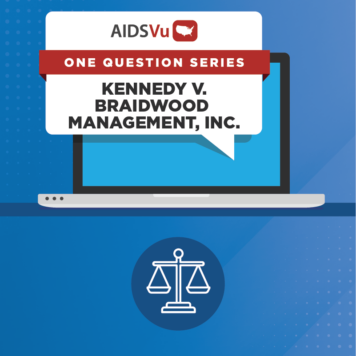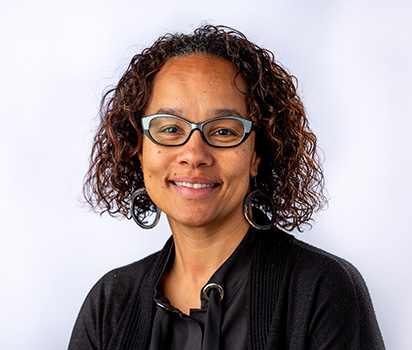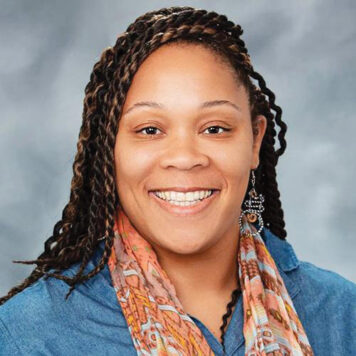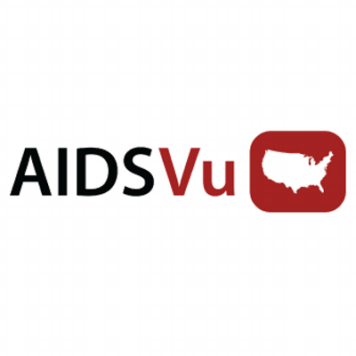Nicole Roebuck, MSW, is the Executive Director for AID Atlanta
Q: You have been working at AID Atlanta for almost 20 years. How did you first get involved in the field of HIV and how has the work changed over the last two decades?
I first started in the HIV field when I was attending NYU and interning in New York City. At the internship, we had a resident center for children living with HIV. One of my first clients was a little girl that unfortunately died, and that has stuck with me to this day. Seeing children who were infected and dying of HIV made me want to make a difference in this field.
In terms of how things have changed, there’s so much more technology and medicine available to people now. There’s no longer a need to take twenty pills every day – people can take one pill a day and live very healthy lives. However, for those patients who are still experiencing disparate outcomes or are suffering from social or medical disparities, the situation remains unchanged. These disparities still have a huge impact on whether people are successful and healthy, especially among minority populations.
Q: Atlanta is among the top three cities nationwide for annual new HIV diagnoses, just behind Miami and Orlando. What factors are driving the high rates of new HIV infections in Atlanta?
I don’t think that is a coincidence. There are more disparate outcomes in Atlanta and other Southern cities, not only in terms of health, but also in terms of education, economics, and socioeconomic status. In Southern states poverty, racism, and lack of access to health care, all go hand-in-hand and gravely impact the HIV epidemic.
I think there is also a political factor at play here. Georgia is now looking into a Medicaid waiver, which would give us the opportunity to provide these newly insured people with more health care, but currently, we have to provide care without that expansion. It’s not the full Medicaid expansion that we need, but it’s a start!
Q: How does AID Atlanta work to address the disproportionate impact of HIV on Southern cities like Atlanta?
AID Atlanta was founded in 1982 and has always been a grassroots entity. Our goal is to have the most impact on and reach those who need our services the most. As we’ve seen HIV change over the decades, we’ve had to change our approach in order to reach those folks who are most impacted, like our minority populations.
We have two health care centers, one in Midtown Atlanta as well as one in Newnan, which is a more rural area that serves twelve counties in Georgia Public Health District Four. We also have case management, coordination, HIV and STI testing, screening, and treatment. We have an onsite pharmacy in both locations which makes it easier for folks to have all the services in one place. We have mental health programs and workshops that help people with anything from social security, disability, medication adherence, and how to manage and maintain balance in order to be healthy and happy.
Currently, our patient population mirrors the HIV epidemic here in Atlanta and Georgia, and as a result, we try to tailor our programs to ensure that they know we’re here for them. Awareness is part of the issue too; sometimes people may not know AIDS service providers exist. Making sure people know there are services and resources, that are often free, is key. They can come in and get tested, receive STI screenings, treatments, health services, care coordination, case management, etc. to help them navigate through the issues that may impact them getting into and remaining in care.
One example of our efforts is the M.E.N. program (Men’s Engagement Network). The program specifically targets Black Gay Men of any age to try and get them engaged in issues related to their health and their quality of life. This program goes beyond just HIV prevention because people want to hear about ways that they can improve their quality of life, how that impacts their decisions and their choices about their overall health, as well as their sexual health.
Q: President Trump recently announced a plan to end HIV by 2030, which specifically targets 48 high-burden counties, along with San Juan, Puerto Rico, Washington, D.C., and seven states with a substantial rural HIV burden. Nearly half (48%) of the highest burden counties and most of the states are in the South. What needs to be done in order to make sure the South is able to meet this plan’s goals?
The technology is there. The science is also there on how to drive down new infections. How do you get people into primary or medical care? You make sure they have access to medication, and you work with them to make sure they take that medication. All of that diminishes the ability of HIV positive people to infect other people, and in turn, drives down the new infection rate. I think social determinants of health such as a lack of housing, transportation, food insecurity, male health issues, substance issues, etc. all need to be addressed before we can really make strides in the right direction.
It’s always going to take more than just providing medical care or medication. Otherwise, we’d have the epidemic resolved by now. It’s not that simple. People have other types of needs that unfortunately tend to get in the way of them getting into care or remaining in care. It needs to be a comprehensive approach that is inclusive of support services like mental health services, care coordination, case management, and peer support. Peer navigation, for example, has been a really effective tool in helping folk to understand that there are others living with HIV like them and they are doing well. Providing that type of coaching and counseling from a peer perspective really does work.
I also want to highlight the importance of involving people living with HIV in all our decision making. When we ask questions like, “What do you think needs to happen? How do you think we need to approach things?” we need to ask the people who are most impacted, those that are infected, or those who are a part of a vulnerable community. I think they have the answers and I don’t ever want to forget the importance of involving people living with HIV and AIDS.
Q: National HIV Testing Day is an opportunity to highlight the role testing plays in ending the HIV epidemic. What activities does AID Atlanta have planned and what is your message to the HIV community on this day?
AID Atlanta has a week of activities leading up to June 27 (National HIV Testing Day). We partner with the Fulton County Board of Health to host activities like a “Mall Crawl.” Fulton County and service partners move around every hour to different malls to do mobile testing, which is a unique way of getting the word out there and performing tests. We also host a block party event to try to get people engaged in something fun while they are learning and getting tested. And our Safe testing program will be open as well during that week, which is where we get a lot of our testing volume.
My message is the same message that I give to my own friends: it’s very important to know where you stand. Know where you stand with HIV and know your status because you can make different decisions based on that knowledge. You might not be ready and that’s okay. You might be ready to start taking medication and get linked directly into care. Just knowing your status is key. Know where you stand.




